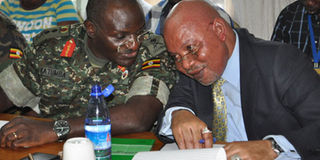MPs turn on each other over UPDF mission in South Sudan

Minister of state for Defence Jeje Odongo (R) shares a moment with the Chief of Defence Forces Katumba Wamala while appearing before Parliament Defence Committee to explain UPDF deployment in South Sudan on Thursday. Photo by Geoffrey Sseruyange
What you need to know:
Rescue mission. Army says they have rescued 30, 000 Ugandans ever since fighting broke out in December last year.
Kampala.
Members of the Defence and Internal Committee in Parliament on Friday turned on each other instead of getting answers why the UPDF was deployed in the warring South Sudan without approval of parliament.
The Minister of State for Defence, Gen Jeje Odongo, was appearing before the committee for the second day running, instead of the senior Minister Crispus Kiyonga.
On Wednesday, the Speaker of Parliament, Ms Rebecca Kagada, wrote to the Minister of Defence asking for information to guide her recall parliament from recess to give retrospective approval for UPDF deployment in South Sudan.
On Thursday afternoon, the Speaker received a letter from State House written by president Museveni requesting her to recall parliament “to approve my actions as is provided for by the UPDF Act.”
Though the letter was dated December 24, 2013, the Speaker said she received it on Thursday and suggested State House had back-dated it to appear it had been sent long ago and her office had been sitting on it.
The Defence committee had summoned the Minister of Defence, Dr Crispus Kiyonga, to explain the deployment on Thursday.
But Kiyonga did not show up, because he was out of the country.
MP Ibrahim Semujju Nganda (Kyadondo East, FDC) told the committee on Thursday that he had information that Kiyonga and the Chief of Defence Forces, Gen Katumba Wamala, were in South Sudan.
Only Gen Odong appeared on Thursday and was asked back the following day.
When he re-appeared on Friday, instead of the committee members asking him about the deployment, they turned on each other.
Some said the meeting was no longer necessary since parliament which is mandated to approve the deployment had already been recalled.
The bickering degenerated into a shouting session and Gen Odongo requested the committee chairperson Benny Namugwanya (Mubende Woman, NRM) to allow his team go out until the MPs resolved their issues.
Odong was disturbed by a claim from MP Odonga Otto (Aruu County) that only soldiers from particular tribes had been deployed “to die” in South Sudan.
“If you don’t know something, don’t parade your ignorance, please,” a visibly upset Odong charged.
MP Fungaroo Kaps Hassan (Obongi, FDC) the opposition Shadow Minister for Security, was engaged in a bitter exchange with Simon Mulongo (Bubulo East, NRM), prompting the latter to call him “a shadow, just with shadow ideas”.
Gen Odongo defended the UPDF deployment in South Sudan.
He said the collapse of authority in South Sudan is tantamount to an invitation of the LRA rebels back to northern Uganda.
“Further, our strategic depth imperative occasioned by our small size necessitates that we should prevent situations on our territory.
Rather, they should be dealt with as far away from our border as possible. That is the best way we can secure our country,” Gen Odong said.
Gen Katumba told MPs that at least 30,000 Ugandans had been evacuated from South Sudan since the UPDF deployed there after the fighting broke out last month.
He said the latest group of 130 arrived on Friday from Bor.
He said negotiations were ongoing to sign a “status of force” agreement with the South Sudan government to formally clarify the authority under which the UPDF was deployed.
He was responding to a question by MP Muwanga Kivumbi (Butamba County, DP) on whether the South Sudan government had authorised the deployment.
In his letter to Ms Kadaga, President Museveni had said: “I decided to deploy, initially, a small force to guard Juba airport with the agreement of President Salvar Kiir, as well as other elements.
I intend to deploy greater capacity if the situation does not improve.”
Museveni said the intention of the deployment was for “peacekeeping” and if necessary, “for peace enforcement.”



